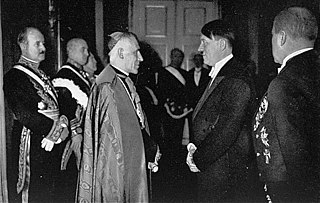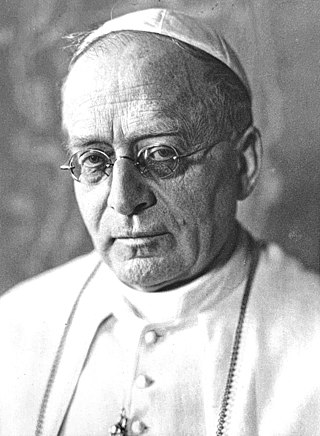Related Research Articles
Antisemitism in Christianity, a form of religious antisemitism, is the feeling of hostility which some Christian Churches, Christian groups, and ordinary Christians have towards the Jewish religion and the Jewish people.

Pope Pius XII, born Eugenio Maria Giuseppe Giovanni Pacelli, was head of the Catholic Church and sovereign of the Vatican City State from 2 March 1939 until his death in October 1958. Before his election to the papacy, he served as secretary of the Department of Extraordinary Ecclesiastical Affairs, papal nuncio to Germany, and Cardinal Secretary of State, in which capacity he worked to conclude treaties with European and Latin American nations, such as the Reichskonkordat with the German Reich.

Pope Benedict XV, born Giacomo Paolo Giovanni Battista della Chiesa, was head of the Catholic Church from 1914 until his death in January 1922. His pontificate was largely overshadowed by World War I and its political, social, and humanitarian consequences in Europe.

Pope Pius XI, born Ambrogio Damiano Achille Ratti, was head of the Catholic Church from 6 February 1922 to his death in February 1939. He was the first sovereign of Vatican City from its creation as an independent state on 11 February 1929. He assumed as his papal motto "Pax Christi in Regno Christi", translated "The Peace of Christ in the Kingdom of Christ".

Mit brennender SorgeOn the Church and the German Reich is an encyclical of Pope Pius XI, issued during the Nazi era on 10 March 1937. Written in German, not the usual Latin, it was smuggled into Germany for fear of censorship and was read from the pulpits of all German Catholic churches on one of the Church's busiest Sundays, Palm Sunday.

Pietro Gasparri, GCTE was a Roman Catholic cardinal, diplomat and politician in the Roman Curia and the signatory of the Lateran Pacts. He served also as Cardinal Secretary of State under Popes Benedict XV and Pope Pius XI.

Michael Ritter von Faulhaber was a German Catholic prelate who served as Archbishop of Munich for 35 years, from 1917 to his death in 1952. Created Cardinal in 1921, von Faulhaber criticized the Weimar Republic as rooted in treason in a speech at the 62nd German Catholics' Day of 1922. Cardinal von Faulhaber was a leading member and co-founder of the Amici Israel, a priestly association founded in Rome in 1926 with the goal of advocating Jewish-Christian reconciliation.

Nahum ben Joseph Samuel Sokolow was a Zionist leader, author, translator, and a pioneer of Hebrew journalism.

Hitler's Pope is a book published in 1999 by the British journalist and author John Cornwell that examines the actions of Eugenio Pacelli, who became Pope Pius XII, before and during the Nazi era, and explores the charge that he assisted in the legitimization of Adolf Hitler's Nazi regime in Germany, through the pursuit of a Reichskonkordat in 1933. The book is critical of Pius' conduct during the Second World War, arguing that he did not do enough, or speak out enough, against the Holocaust. Cornwell argues that Pius's entire career as the nuncio to Germany, Cardinal Secretary of State, and Pope, was characterized by a desire to increase and centralize the power of the Papacy, and that he subordinated opposition to the Nazis to that goal. He further argues that Pius was antisemitic and that this stance prevented him from caring about the European Jews.
This is a list of countries where antisemitic sentiment has been experienced.
Antisemitism in the history of the Jews in the Middle Ages became increasingly prevalent in the Late Middle Ages. Early instances of pogroms against Jews are recorded in the context of the First Crusade. Expulsions of Jews from cities and instances of blood libel became increasingly common from the 13th to the 15th century. This trend only peaked after the end of the medieval period, and it only subsided with Jewish emancipation in the late 18th and 19th centuries.
The relations between Pope Benedict XVI and Judaism remained fairly good, although concerns were raised by Jewish leaders over the political impact of Traditionalists in the Church during the papacy of Benedict.

The relations between Pope Pius XII and Judaism have long been controversial, especially those questions that surround Pope Pius XII and the Holocaust. Other issues involve Pius's Jewish friendships and his attitude towards the new state of Israel.

The relations between Pope Pius XI and Judaism during his reign from 1922 to 1939 are generally regarded as good. The pontiff was particularly opposed to antisemitism, an important issue at the time when Nazi Germany was rising. Certain favourable opinions of Pius XI were subsequently used to attack the perceived silence of Pope Pius XII.

The papacy of Pius XII began on 2 March 1939 and continued to 9 October 1958, covering the period of the Second World War and the Holocaust, during which millions of Jews and others were murdered by Adolf Hitler's Germany. Before becoming pope, Cardinal Pacelli served as a Vatican diplomat in Germany and as Vatican Secretary of State under Pius XI. His role during the Nazi period has been closely scrutinised and criticised. His supporters argue that Pius employed diplomacy to aid the victims of the Nazis during the war and, through directing his Church to provide discreet aid to Jews and others, saved hundreds of thousands of lives. Pius maintained links to the German Resistance, and shared intelligence with the Allies. His strongest public condemnation of genocide was, however, considered inadequate by the Allied Powers, while the Nazis viewed him as an Allied sympathizer who had dishonoured his policy of Vatican neutrality.

Popes Pius XI (1922–1939) and Pius XII (1939–1958) led the Catholic Church during the rise and fall of Nazi Germany. Around a third of Germans were Catholic in the 1930s, most of them lived in Southern Germany; Protestants dominated the north. The Catholic Church in Germany opposed the Nazi Party, and in the 1933 elections, the proportion of Catholics who voted for the Nazi Party was lower than the national average. Nevertheless, the Catholic-aligned Centre Party voted for the Enabling Act of 1933, which gave Adolf Hitler additional domestic powers to suppress political opponents as Chancellor of Germany. President Paul Von Hindenburg continued to serve as Commander and Chief and he also continued to be responsible for the negotiation of international treaties until his death on 2 August 1934.

During the pontificate of Pope Pius XI (1922–1939), the Weimar Republic transitioned into Nazi Germany. In 1933, the ailing President von Hindenburg appointed Adolf Hitler as Chancellor of Germany in a Coalition Cabinet, and the Holy See concluded the Reich concordat treaty with the still nominally functioning Weimar state later that year. Hoping to secure the rights of the Church in Germany, the Church agreed to a requirement that clergy cease to participate in politics. The Hitler regime routinely violated the treaty, and launched a persecution of the Catholic Church in Germany.
The canonization process of Pope Pius XII dates to shortly after his death in 1958. He was declared a servant of God in 1990 and venerable in 2009. Father Peter Gumpel was the relator of Pius XII's cause for canonization. The potential beatification of Pius XII has raised concern, especially by Jewish organisations, because of his controversial record during the Holocaust. The objections especially arise because of the refusal by the Vatican to allow independent access to the Vatican's archives for the period of Pius XII's papacy.
Events in the year 1930 in Vatican City.
Zionist antisemitism is the phenomenon in which individuals, groups, or governments support the Zionist movement and the State of Israel while they simultaneously hold antisemitic views about Jews. In some cases, Zionism may be promoted for explicitly antisemitic reasons. The prevalence of antisemitism has been widely noted within the Christian Zionist movement, whose adherents may hold antisemitic and supersessionist beliefs about Jews while they also support Zionism for eschatological reasons. Antisemitic right-wing nationalists, particularly in Europe and the United States, sometimes support the Zionist movement because they wish that Jews be expelled or that they emigrate to Israel. The Israeli government's alleged collaboration with antisemitic politicians abroad has been criticized as an example of Zionist antisemitism. Anti-Zionists have criticized the Zionist movement for its alleged complicity with or its alleged capitulation to antisemitism since its inception, with some anti-Zionists also referring to Zionism as a form of antisemitism.
References
- ↑ The Popes Against the Jews Archived 2009-09-24 at the Wayback Machine
- ↑ "The Holocaust: What Was Not Said", Martin Rhonheimer, First Things Magazine, November 2003, retrieved 1 July 2009 "Article | First Things". Archived from the original on 2009-10-16. Retrieved 2009-10-16.
- ↑ Eugenio Pacelli and the Zionists Archived 2011-07-27 at the Wayback Machine